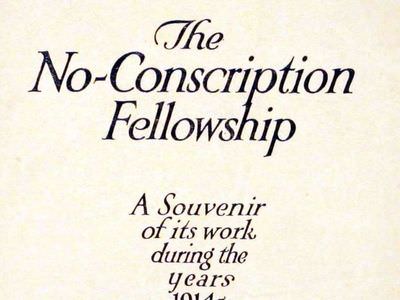No-Conscription Fellowship
No-Conscription Fellowship
Collection: Conscientious Objection During World War 1 Volumes No-Conscription Fellowship
Filter Documents

Reports of the Conscientious Objector Information Bureau
The NCF, together with the Fellowship of Reconciliation and the Friends' Service Committee created the Joint Administrative Council (JAC) to co-ordinate their work the better to promote the anti-war campaign...
Date:1916-1919Contributor:Working Class Movement Library
Identifier:73006a-05

NCF publications
Throughout the war and in the early years of peace after 1918, the NCF kept up a constant stream of leaflets, pamphlets and more substantial work. These are all represented...
Date:1914-1919Contributor:Working Class Movement Library
Identifier:73006a-06

Thomas Ellison scrapbook
Originally discovered in the Leigh Meeting House of the Society of Friends, this fascinating collection of CO ephemera and personal writing was deposited at the Working Class Movement Library in...
Date:1916-1919Contributor:Working Class Movement Library
Identifier:73006a-07

National Committee papers
It's annual conference of 'convention' was a central part of the NCF's organisation. Its November 1915 conference established its broad principles and the conference report, reproduced here, contains first reliable...
Date:1916-1920Contributor:Working Class Movement Library
Identifier:73006a-01

Willesden branch
The Willesden branch of the NCF served an area of North London which was, arguably, one of the anti-war movement's most militant centres. It had at least 145 COs of...
Date:1916-1919Contributor:Hull University Archives
Identifier:73006a-02

Hyde branch
The NCF local branches were the heart of the anti-war movement. There anti-war activists drawn from a variety of political backgrounds made common cause in opposing the war and supporting...
Date:1916-1920Contributor:Working Class Movement Library
Identifier:73006a-03

The Tribunal
'The object of the "Tribunal"', wrote editor, Will Chamberlain, upon its first publication on 8 March 1916, 'will be to acquaint our members and the general public with those facts...
Date:1916-1920Contributor:Working Class Movement Library
Identifier:73006a-04
